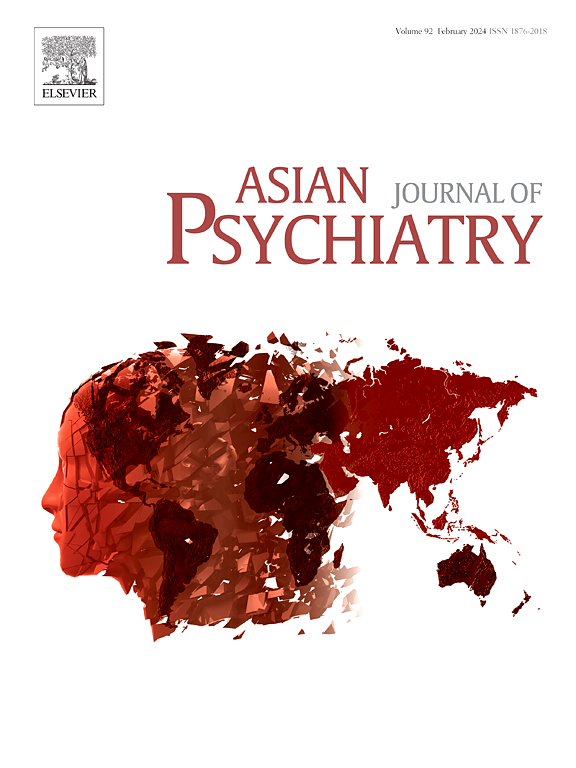中国实施“让我们谈谈孩子”干预的障碍与促进因素:一项定性研究
IF 4.5
4区 医学
Q1 PSYCHIATRY
引用次数: 0
摘要
基于证据的干预措施往往不能转化为实践。本研究旨在找出影响“让我们谈谈孩子”(Let 's Talk about Children, LTC)实施的促进因素和障碍,LTC是一项针对父母患有精神疾病的儿童家庭的家庭干预措施。此外,我们的目标是提供可操作的策略来扩大LTC在中国的规模。方法对48个综合实施框架(CFIR)构建进行评估,选出10个构建。我们在CFIR的指导下进行了焦点小组讨论,以描述不同利益相关者在实施过程中的经验。根据地理和经济可行性,在中国选择了8个地点。对焦点小组进行录音和转录以供分析。结果确定的实施促进因素包括:(1)接受优势,(2)适应性,(3)获取知识和信息,(4)满足需求,(5)强烈的动机,(6)团队合作。研究参与者在以下方面表达了不同的观点:(1)兼容性,即与工作流程的整合;(2)参与度,即吸引和鼓励参与的效果。实施障碍包括:(1)当地对心理健康的态度;(2)当地资源,两者都属于外部环境领域。总结了扩大LTC干预实施的可操作策略。结论LTC项目的优势在实施初期就得到了广泛认可,因此对精神卫生人员进行针对性的培训对于促进以家庭为中心的实践的发展以满足COPMI及其家庭的需求至关重要。需要长期的努力来减少已确定障碍的负面影响,并改进LTC计划以实现未来的可扩展性。本文章由计算机程序翻译,如有差异,请以英文原文为准。
Barriers and facilitators to implementing the Let’s Talk about Children intervention in China: A qualitative study
Background
Evidence-based interventions often fail to translate into practice. This study aims to identify facilitators and barriers that affect the implementation of Let’s Talk about Children (LTC), a family-focused intervention for families of children with parental mental illness (COPMI). Furthermore, we aim to offer actionable strategies to scale up LTC in China.
Method
We assessed 48 Consolidated Framework for Implementation (CFIR) constructs and selected 10 constructs. We conducted focus groups guided by the CFIR to describe diverse stakeholders’ experience during the implementation process. Eight sites in China were selected based on geographic and economic feasibility. Focus groups were audio-recorded and transcribed for analysis.
Results
Implementation facilitators identified included: (1) acceptance of advantages, (2) adaptability, (3) access to knowledge and information, (4) fulfilled needs, (5) strong motivation, (6) teamwork. Study participants expressed mixed views on: (1) compatibility, that is, integration with workflow processes, and (2) engagement, that is, effect of attracting and encouraging participation. Implementation barriers included: (1) local attitudes on mental health, and (2) local resources, both of which were in the Outer Setting domain. Actionable strategies scaling up the implementation of LTC intervention were summarized.
Conclusion
As the advantages of the LTC program were widely recognized during our initial implementation, tailored training for mental health staff is essential to facilitate the development of family-focused practices to address the needs of COPMI and their families. Long-term efforts are necessary to decrease the negative impact of the identified barriers and refine the LTC program for future scalability.
求助全文
通过发布文献求助,成功后即可免费获取论文全文。
去求助
来源期刊

Asian journal of psychiatry
Medicine-Psychiatry and Mental Health
CiteScore
12.70
自引率
5.30%
发文量
297
审稿时长
35 days
期刊介绍:
The Asian Journal of Psychiatry serves as a comprehensive resource for psychiatrists, mental health clinicians, neurologists, physicians, mental health students, and policymakers. Its goal is to facilitate the exchange of research findings and clinical practices between Asia and the global community. The journal focuses on psychiatric research relevant to Asia, covering preclinical, clinical, service system, and policy development topics. It also highlights the socio-cultural diversity of the region in relation to mental health.
 求助内容:
求助内容: 应助结果提醒方式:
应助结果提醒方式:


